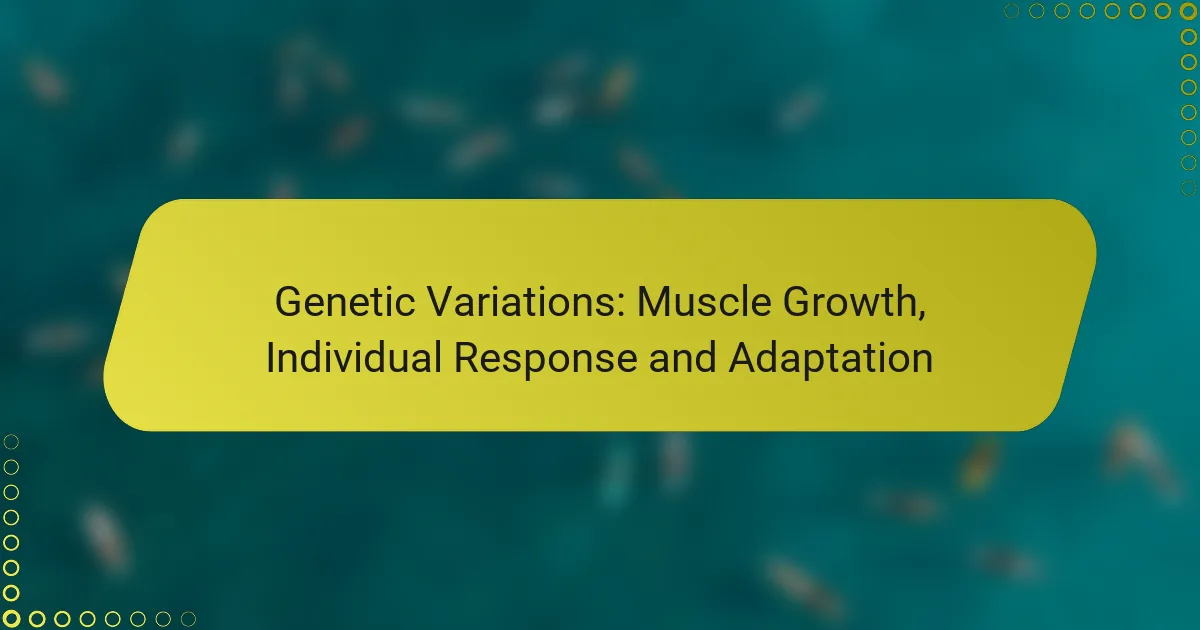Genetic factors play a crucial role in determining how effectively the body absorbs and utilizes nutrients, influencing overall health. Variations in genes can impact enzyme production, metabolism, and gut microbiota composition, which are essential for nutrient uptake. By understanding these genetic influences, individuals can adopt tailored dietary strategies to optimize nutrient absorption and efficiency.

How Do Genetic Factors Affect Nutrient Absorption Rates?
Genetic factors significantly influence nutrient absorption rates by determining how effectively the body processes and utilizes various nutrients. Variations in genes can affect enzyme production, metabolism, and even the composition of gut microbiota, all of which play crucial roles in nutrient uptake.
Genetic variations influence enzyme production
Genetic variations can lead to differences in the production of digestive enzymes, which are essential for breaking down food into absorbable nutrients. For instance, individuals with certain genetic traits may produce higher levels of lactase, allowing them to digest lactose more efficiently than those with lower levels. This variation can impact dietary choices and overall nutrient absorption.
Moreover, the efficiency of enzymes like amylase and lipase, which break down carbohydrates and fats respectively, can also vary genetically. Understanding these differences can help individuals tailor their diets to optimize nutrient intake based on their unique genetic makeup.
Single nucleotide polymorphisms (SNPs) impact nutrient metabolism
Single nucleotide polymorphisms (SNPs) are small genetic variations that can significantly affect how nutrients are metabolized in the body. For example, certain SNPs in genes related to folate metabolism can influence how well an individual absorbs and utilizes folate from food sources. This can have implications for health, particularly in populations at risk for deficiencies.
Additionally, SNPs can affect the metabolism of vitamins and minerals, leading to variations in nutrient needs among individuals. Recognizing these genetic differences can guide personalized nutrition strategies to enhance health outcomes.
Hereditary traits affect gut microbiome composition
Genetic factors also play a role in shaping the gut microbiome, which is crucial for nutrient absorption. Hereditary traits can influence the diversity and abundance of microbial species in the gut, affecting how well nutrients are fermented and absorbed. A diverse microbiome is generally associated with better nutrient absorption and overall health.
For instance, individuals with specific genetic predispositions may harbor beneficial bacteria that enhance the breakdown of complex carbohydrates, leading to improved nutrient availability. Understanding one’s genetic background can inform dietary choices that support a healthy gut microbiome and optimize nutrient absorption.

What Nutrients Are Most Affected by Genetics?
Genetics significantly influences the absorption rates and efficiency of various nutrients, impacting overall health. Key nutrients affected by genetic variations include vitamin D, iron, and folate, each with specific genetic factors that can alter how the body processes them.
Vitamin D absorption influenced by genetic variants
Genetic variants can affect how well the body absorbs vitamin D, a crucial nutrient for bone health and immune function. For instance, polymorphisms in the vitamin D receptor (VDR) gene can lead to variations in vitamin D metabolism, potentially resulting in lower serum levels despite adequate sunlight exposure or dietary intake.
Individuals with certain VDR gene variants may need to increase their vitamin D intake through fortified foods or supplements, especially in regions with limited sunlight. Regular testing of vitamin D levels can help determine if supplementation is necessary.
Iron metabolism affected by HFE gene mutations
The HFE gene plays a critical role in iron metabolism, and mutations in this gene can lead to conditions such as hereditary hemochromatosis, which causes excessive iron absorption. This can result in iron overload, potentially damaging organs if not managed properly.
People with HFE mutations should monitor their iron levels regularly and may need to limit dietary iron intake or undergo therapeutic phlebotomy to manage excess iron. Foods high in vitamin C should be consumed cautiously, as they can enhance iron absorption.
Folate absorption linked to MTHFR gene
The MTHFR gene is essential for processing folate, a vital B vitamin involved in DNA synthesis and repair. Variants in the MTHFR gene can impair the conversion of folate into its active form, leading to lower levels of this nutrient in the body.
Individuals with MTHFR mutations may benefit from consuming foods rich in folate, such as leafy greens and legumes, or considering supplementation with methylated forms of folate. Regular assessment of folate levels can help guide dietary choices and supplementation needs.

How Can Genetic Testing Improve Nutrient Efficiency?
Genetic testing can enhance nutrient efficiency by identifying individual variations in nutrient absorption and metabolism. This information allows for tailored dietary strategies that optimize nutrient intake based on genetic predispositions.
Personalized nutrition plans based on genetic profiles
Personalized nutrition plans leverage genetic profiles to create diets that align with an individual’s unique metabolic needs. For instance, someone with a genetic variant affecting vitamin D metabolism may require higher dietary sources of this nutrient or increased sun exposure.
These plans can also consider how individuals process macronutrients like fats and carbohydrates, leading to more effective weight management and overall health. Utilizing genetic insights helps in crafting diets that not only meet caloric needs but also enhance nutrient absorption.
Targeted supplementation strategies
Targeted supplementation strategies focus on providing specific nutrients that individuals may not absorb efficiently due to their genetic makeup. For example, those with genetic variations affecting folate metabolism might benefit from taking methylated forms of folate rather than standard supplements.
By understanding genetic influences, individuals can select supplements that are more likely to be effective, reducing waste and enhancing health outcomes. Consulting with a healthcare professional can help determine the most beneficial supplements based on genetic testing results.
Identifying nutrient deficiencies through genetic insights
Genetic insights can reveal predispositions to certain nutrient deficiencies, allowing for proactive dietary adjustments. For example, individuals with specific genetic markers may be at higher risk for iron deficiency, prompting them to include more iron-rich foods in their diet.
Regular genetic testing can help track these deficiencies over time, ensuring that dietary changes are effective. This approach not only supports better health but also can prevent long-term complications associated with nutrient deficiencies.

What Role Do Epigenetics Play in Nutrient Absorption?
Epigenetics significantly influences nutrient absorption by modifying how genes express themselves in response to environmental factors and dietary habits. These changes can affect the efficiency of nutrient uptake and overall health outcomes.
Environmental factors modify gene expression
Environmental factors such as exposure to toxins, stress, and lifestyle choices can alter gene expression related to nutrient absorption. For instance, pollutants may inhibit the expression of genes responsible for transporting essential vitamins and minerals, leading to deficiencies.
Additionally, factors like physical activity and sleep patterns can also impact how well our bodies absorb nutrients. Regular exercise can enhance the expression of genes that facilitate nutrient uptake, while chronic stress may have the opposite effect.
Dietary habits influence epigenetic changes
Dietary habits play a crucial role in shaping epigenetic modifications that affect nutrient absorption. Consuming a diet rich in fruits, vegetables, and whole grains can promote beneficial epigenetic changes, enhancing the expression of genes that support nutrient transport.
Conversely, diets high in processed foods and sugars may lead to negative epigenetic changes, reducing nutrient absorption efficiency. It’s essential to focus on balanced meals to maintain optimal gene expression related to nutrient uptake.

How Can Individuals Optimize Nutrient Absorption Based on Genetics?
Individuals can enhance nutrient absorption by understanding their genetic predispositions, which influence how efficiently their bodies process various nutrients. Tailoring dietary choices and supplementation strategies based on genetic insights can lead to better health outcomes.
Tailored dietary recommendations
To optimize nutrient absorption, individuals should consider dietary recommendations that align with their genetic profiles. For example, those with specific genetic variants may benefit from higher intakes of certain vitamins or minerals, such as vitamin D or iron, which can be influenced by absorption efficiency.
Consulting with a nutritionist who understands genetic influences can help create a personalized meal plan. This plan might include foods rich in nutrients that an individual is predisposed to absorb poorly, ensuring they meet their dietary needs effectively.
Supplementation based on genetic predispositions
Supplementation can play a crucial role in optimizing nutrient absorption for those with genetic predispositions that affect nutrient utilization. For instance, individuals with genetic markers indicating lower absorption rates of omega-3 fatty acids may benefit from fish oil or algal oil supplements.
Before starting any supplementation, it’s advisable to undergo genetic testing and consult healthcare professionals. They can recommend appropriate dosages and types of supplements based on individual genetic profiles, helping to avoid unnecessary or ineffective products.

What Are the Implications of Genetic Influences on Health?
Genetic influences can significantly affect nutrient absorption rates, impacting overall health and susceptibility to various conditions. Understanding these implications can help individuals make informed dietary choices that align with their genetic predispositions.
Increased risk of chronic diseases
Genetic factors can predispose individuals to chronic diseases such as diabetes, heart disease, and obesity by affecting how efficiently nutrients are absorbed and utilized. For example, variations in genes related to lipid metabolism can lead to higher cholesterol levels, increasing cardiovascular risk.
Individuals with specific genetic markers may need to adopt tailored dietary strategies, such as reducing saturated fat intake or increasing fiber consumption, to mitigate these risks. Regular health screenings can help identify potential genetic predispositions early on.
Impact on overall wellness and vitality
The efficiency of nutrient absorption influenced by genetics can directly affect energy levels, immune function, and overall vitality. For instance, certain genetic variations may hinder the absorption of essential vitamins and minerals, leading to deficiencies that can impair health.
To enhance wellness, individuals should consider genetic testing to understand their unique nutrient needs. Incorporating a balanced diet rich in whole foods, along with personalized supplementation when necessary, can help optimize health outcomes based on genetic profiles.



